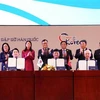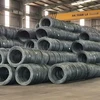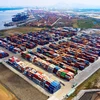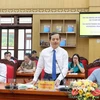Hanoi (VNA) - Vietnam needs to undertake sustained efforts to transform toward a greener and more inclusive economy that is more connected with nature.
Only One Earth, the theme for the World Environment Day this year, stresses a more sustainable and harmonious coexistence with the world around us, the environment and most importantly with mother nature.
For Vietnam, the above theme is also a message to remind the community of the importance of transforming growth models, looking to a greener economy.
The Minister of Natural Resources and Environment Tran Hong Ha emphasised “Only One Earth” with the central motto “Sustainable Living in Harmony with Nature” is the theme of World Environment Day 2022. This message along with the theme “Building a Shared Future for All Life” of the International Day of Biodiversity suggests nations must act decisively and each of us must not forget that there is only one common “Natural Home” for our species in the entire universe. Therefore, people need to reflect on their attitudes and behaviors towards nature. We need to adjust the way resources are used to a more sustainable way and focus on nature-based solutions to solve problems. Global issues such as climate change, health, food security, people’s livelihoods require critical consideration at this juncture. Vietnam is accelerating economic restructuring associated with the development of the digital economy, green economy and circular economy in order to effectively use and conserve natural resources, and protect habitats. The strong declaration of net zero emissions by 2050 demonstrates Vietnam’s determination and political commitment. It wants to take responsibility in solving serious global challenges in terms of climate, environment, and the deterioration of local ecosystems, toward the goal of a healthy planet.
In the past time, political undertakings and commitments have been and continue to be institutionalized. In particular, the Law on Environmental Protection 2020 was officially enforced from January 1st, 2022. It has resulted in many breakthrough policies and solutions, marking a period of strong transformation in environmental protection. The promulgation of the law has helped the Southeast Asian nation trend towards the goal of improving environmental quality, protecting people’s health, ecological balance, biodiversity conservation and sustainable economic development. What is important is that businesses and people will play a center role in the implementation.
Sharing the same view with the Government of Vietnam, Caitlin Wiesen, United Nations Resident Coordinator in Vietnam, Chief Resident Representative of UNDP Vietnam highly appreciated the Vietnamese Government’s drastic actions since COP26. These actions include the establishment of a National Steering Committee on the implementation of Vietnam’s climate commitments. She said, Vietnam’s recently published Draft National Strategy on Climate Change is an important policy tool to assist in realizing the goal of net-zero emissions by 2050 and strengthening resilience in the community. The United Nations will continue to support Vietnam in reviewing its Nationally Determined Contribution and National Adaptation Plan technical report before COP27 in November 2022. In addition, the United Nations will continue cooperating with Vietnam in natural resource management and biodiversity conservation.
 The system of dikes to prevent erosion inland surrounds Ca Mau Cape National Park (Photo: Trong Dat/VNA)
The system of dikes to prevent erosion inland surrounds Ca Mau Cape National Park (Photo: Trong Dat/VNA) Over the past time, environmental protection and solid waste management efforts directed by the Party and State have achieved many important results. Many legal documents on solid waste management have been promulgated by the National Assembly, the Government, the Prime Minister and relevant ministries and sectors. One example is such as the Law on Environmental Protection, Decrees of the Government and Circulars of Ministries guiding the implementation, the National Strategy on Integrated Solid Waste Management and the Prime Minister’s Directive on a number of urgent solutions to strengthen solid waste management. The promulgation of legal documents on solid waste management in order to overcome the limitations and inadequacies in the current management, also proactively prevents and minimizes environmental pollution, and creates a fundamental change in the solid waste management./.




















